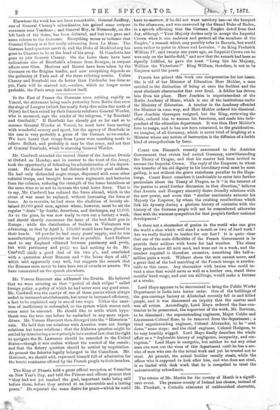Mr. Cardwell attended the annual dinner of the Ancient Druids
at Oxford on Monday, and in answer to the toast of the Army, took the opportunity of defending his administration of his depart- ment. He denied that he had disbanded 20,000 good soldiers. He had only disbanded negro troops, dispensed with some other colonial troops, and brought home some regiments and batteries from the colonies, reducing the strength of the home battalions at the same time so as not to increase the total home force. That is to say, Mr. Cardwell has reduced the force abroad, which in the event of war must be replaced, without increasing the force at home. As to recruits, he had since the abolition of bounty ob- tained 20,000 good men, against whom, however, must be set the regular " drain" by deaths, desertions, and discharges, say 13,000. As to the guns, he was now ready to turn out a battery a week, and should shortly commence the issue of the best field gun in Europe ; while the distribution of Sniders to Volunteers was advancing, so that by April 1, 150,000 would have been placed in their hands. Of powder he had many years' supply, and he was manufacturing pebble-powder as fast as possible. Lord Herbert used to say England vibrated between parsimony and panic, but with parsimony and pink; we had nothing to do. Mr. cud nail ow& a good deal of his two p's, and concluded with a quotation about Romans and " the brave days of old," which told apparently very well, but suggests the remark that the Romans seem never to have been out of swords or arrows. We have commented on the speech elsewhere.






























 Previous page
Previous page